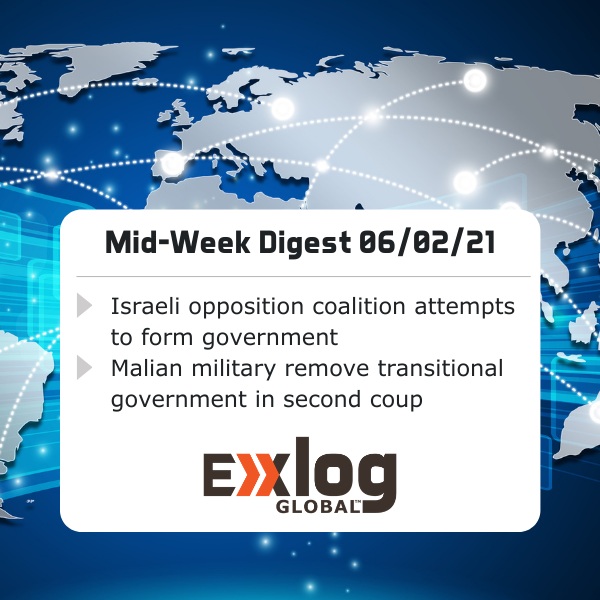Israel: Unprecedented fifth election looming as opposition coalition attempts to oust Prime Minister Netanyahu
Prime Minister Benjamin Netanyahu’s 12-year rule may soon come to an end as opposition leader Yair Lapid has signaled that he believes he has succeeded in forming a coalition government by the Jun. 2 midnight deadline. Netanyahu’s repeated failure to consolidate a working coalition to form a government following the April 2019 election, and reaffirmed for the fourth time on Mar. 23, 2021, has given Lapid an opportunity to form a coalition of his own. Netanyahu, Israel’s longest-serving prime minister, has faced widespread criticism and public opposition following his indictment on corruption charges in 2019.
The coalition needed to oust him will require staunch nationalists—primarily Naftali Bennett of the right-wing Yamina party—to partner with opposing parties, such as the Arab Islamist Party who represents the Israeli Palestinian minority. The current agreement brokered by Lapid appears to have Bennett serving as the prime minister for the first 2 years of a 4-year term, ceding the remainder of the term to Lapid thereafter. While Bennett announced on May 31 that he would join Lapid’s coalition, the intended coalition members must sign onto the coalition and present a framework for the new government by the Jun. 2 deadline. Should Lapid fail, and another candidate does not form a working government before Jun. 21, Israel could have an unprecedented fifth election in just two years. If successful, the new anti-Netanyahu coalition would be extremely fragile, as it would be comprised of right- and left-wing and centrist parties who would need to compromise on their opposing views for the coalition to work. A major flare-up of any controversial issues—such as renewed violence in Gaza—could end the coalition; this fragility was evidenced by the suspension of coalition talks during the recent May 10 outbreak of violence that culminated in a ceasefire on May 21.
The new coalition is also likely to face public opposition due to its extreme diversity while opposing anti-Netanyahu sentiments remain high. The combination of these sentiments suggests the possibility for renewed protests regardless of the outcome of the coalition.
Mali: Military’s “coup within a coup” threatens country’s stability, draws international condemnation
Malian military officers arrested several members of the interim government—including the transitional President, Prime Minister, and Defense Minister—following a controversial cabinet reshuffle that snubbed important military leaders – threatening the already unstable future of the country following an August 2020 coup. Now-interim President Col. Assimi Goita, who headed the August coup against President Ibrahim Boubacar Keita, ordered the arrests of President Bah Ndaw and Prime Minister Moctar Ouane on May 24, citing their failure to consult the military in changes to the government and in negotiations with the country’s main union.
The detention and resignation of Ndaw and Ouane have sparked international fears that the country will no longer uphold its promise to hold new elections in February 2022. However, Col. Goita has stated that the military remains committed to the transitional deal and plans to hold elections as originally promised. The Economic Community of West African States (ECOWAS) held an emergency meeting following the government’s ouster over concerns that the latest coup posed a threat to the transitional deal; the group ultimately suspended Mali from ECOWAS until the interim government returns power to civilian leadership, with the additional stipulation that no current member of the government participates in the new elections. However, ECOWAS stopped short of issuing new sanctions against the country, despite levying them following the August 2020 coup. France has threatened to pull its troops from Mali should Goita allow Islamic radicalism to flourish – France remains a crucial ally in combating Islamic militants (including al Qaeda and ISIL) in Mali and the broader Sahel, and the withdrawal would be extremely detrimental to regional security. ECOWAS has stated that they will continue to mediate with Mali’s interim government in the coming weeks in hopes of implementing policies to stabilize the country, but domestic confidence in the government has waned as the US and EU threaten new sanctions. Additionally, coup leaders’ economic promises have fallen short, doing little to address ongoing security issues and high poverty rates within the country.


